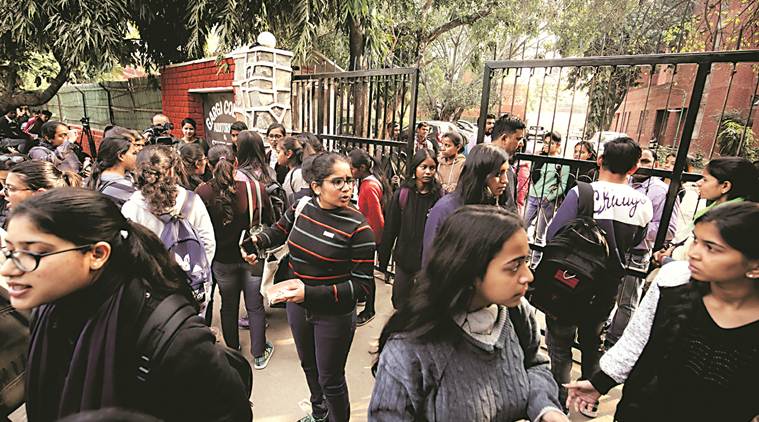 News of the violence in Delhi University’s Gargi College took four days to reach the mainstream media.
News of the violence in Delhi University’s Gargi College took four days to reach the mainstream media.
The narratives of mass sexual violence directed at the women students of Delhi University’s Gargi College during their college fest, Reverie, on February 6 shine a light on the impunity enjoyed by male mobs. News of the violence in the college took four days to reach the mainstream media. The middle-aged, allegedly drunk men entered the college premises without passes, scaled walls and left with impunity. The college administration, the security and the police failed to discharge their duties.
Even as arrests happen, no accountability has been fixed on the college administration and police for their failure to prevent a mob of about 100 men from trespassing into the campus. The rioters created a nasty traffic snarl, which went without public comment as well.
The assailants molested women and indulged in acts of extreme depravity in the full glare of CCTV and phone cameras. Their bodies were their weapons and the men knew that they would get away. The idea that women students have rights was totally irrelevant to these male mobs. The space for a college festival turned into a theatre of macabre sexual violence.
The police seem to have offered mobs a new “model” of violence to emulate: On December 15, 2019, the city saw in horror as police entered the Jamia Millia campus, assaulted students and destroyed property. Students studying in a library were mercilessly tear-gassed. The testimonies of women students were chilling in depicting how the custodians of law directed sexualised violence at women’s bodies. The obituary to the Vishakha judgment was written that night.
Slogans exhorted the men to shoot “traitors” and guns were directed at Jamia students. No accountability was fixed, no arrests made and there were no enquiries. The evidence was on national television, live feeds, photographs, testimonies, medico-legal certificates and in reports of fact-finding teams. Yet not one student of Jamia has got compensation — the due process to ensure justice has not even been initiated.
Subsequently, women protestors at Shaheen Bagh and elsewhere took on the task of calling out the police violence and reclaiming constitutionalism. The dadis at Shaheen Bagh reclaimed Delhi as a city of and for women and children. They too were demonised by the ruling party.
It was barely 20 days since the violence in Jamia. The entry of assailants armed with sledgehammers, stones and sticks in JNU on the evening of January 5 was on every TV screen. Yet a month later, there were no any arrests nor was any accountability fixed at the level of the university administration. Stones were pelted at teachers. Women were attacked in hostels, Muslim students targeted, even blind students were not spared. Homes of faculty members were attacked. The police flew drones over the protesting teachers and students thereafter. Complaints by students and teachers have not been converted into FIRs. The university continues to feel unsafe. There is far more trauma on the campus than can be catalogued.
Those who stood in support of the JNU students and teachers were demonised. Several teachers, students, activists, lawyers and citizens who protested against the violence in JNU in various parts of the country were detained, arrested or show-caused. Student protesters have been beaten and molested in custodial detention — and yet the courts must be seized with the important question of traffic snarls.
Protesting students of Jamia reported violence by the Delhi police on February 11. There were reports of upholders of the law violating women’s bodies, highlighting, once again, that custodial and sexual torture gets intensified when Muslim women are seen as the “other”.
There is enough evidence to argue that the state has incubated a vicious culture of impunity to discipline and punish students. Why has the relationship between law and society shifted so fundamentally?
The writer is Associate Professor, Centre for the Study of Law and Governance, JNU